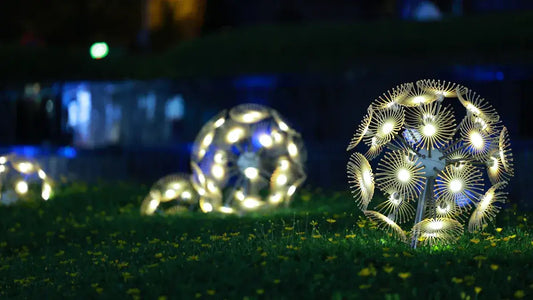Do Solar Lights Charge on Cloudy Days?
If you rely on solar lights for your garden, pathway, or patio, you may have wondered: Do outdoor solar lighting systems charge when it’s cloudy? The answer is yes - but with reduced efficiency. In this comprehensive guide, we’ll explore:
- how exterior solar lamps perform in different weather conditions?
- how to maximize their charging capabilities?
- which solar LED lights work best in low sunlight?

How Do Solar Powered Lights Work?
Outdoor solar lighting operates using photovoltaic (PV) panels that absorb sunlight and convert it into electricity. This energy is stored in rechargeable batteries, which power LED solar light fixtures after dark. However, since these systems depend on sunlight, their performance can vary based on weather conditions.
Key Factors Affecting Solar Light Charging
- Sunlight intensity: Direct sunlight provides the fastest charging.
- Daylight duration: Longer days (summer) mean more charging time.
- Panel angle and placement: Proper positioning maximizes sunlight absorption.
- Battery capacity: Higher mAh batteries store more energy for cloudy days.
Do Solar Lights Charge on Cloudy Days?
Yes, outdoor solar light systems can still charge under overcast skies, but their efficiency drops significantly. Here’s how different conditions affect charging:
| Weather Condition | Charging Efficiency |
| Bright, sunny day | 100% (optimal charging) |
| Partly cloudy | 50-70% efficiency |
| Heavy clouds | 20-30% efficiency |
| Rainy/foggy days | 10-20% (minimal charging) |
While solar powered lights won’t charge as quickly on cloudy days, high quality solar outdoor lighting with efficient panels can still gather enough energy to function at night.
How to Improve Solar Light Performance in Cloudy Weather?
If you live in an area with frequent overcast conditions, follow these tips to keep your outdoor lamps solar running efficiently:
1. Optimize Solar Panel Placement
- Install solar light outdoor fixtures where they receive maximum sunlight (south facing locations are best in the Northern Hemisphere).
- Avoid shade from trees, buildings, or other obstructions.
- Adjustable panels can help capture more light as the sun moves.
2. Clean Solar Panels Regularly
- Dust, dirt, snow, and bird droppings can block sunlight.
- Wipe panels with a damp cloth every few weeks for best performance.
3. Choose High Efficiency Solar LED Lights
- Monocrystalline solar panels perform better in low light than polycrystalline ones.
- Look for solar powered lighting with high capacity batteries (2000mAh or more) for longer runtime.
- Motion sensor solar lights conserve energy by only activating when needed.
4. Use Hybrid or Backup Power Options
- Some outdoor lights solar come with dual charging (solar + USB/battery backup).
- For areas with prolonged cloudy weather, consider solar lamps for outside with removable batteries for manual charging.
5. Reduce Light Brightness or Use Dimming Modes
- Many solar light for outside models have adjustable brightness settings.
- Lowering brightness extends battery life on days with poor charging.
Best Solar Powered Light Outdoor for Cloudy Climates
If you need reliable solar lamps outdoor that work well even in low sunlight, look for these features:
- High efficiency monocrystalline panels: Better at capturing diffused light.
-
Large battery capacity: 2000mAh+ for extended operation.
-
Weatherproof & durable: IP65 or higher for rain/snow resistance.
- Adjustable panels & brightness: For optimizing light output.
Frequently Asked Questions (FAQs)
1. Can solar lights charge through windows?
No, most glass blocks UV rays, reducing charging efficiency. Always place solar powered lights outside.
2. How long do solar lights stay on at night?
Typically 6-10 hours, depending on battery capacity and sunlight exposure.
3. Do solar lights work in winter?
Yes, but shorter days and snow cover may reduce performance.
4. Why do my solar lights die quickly?
Possible causes:
- Poor sunlight exposure
- Dirty solar panels
- Old or degraded batteries
Maximizing Your Outdoor Solar Lighting
While solar lights do charge on cloudy days, their efficiency depends on weather, placement, and product quality. By choosing the right solar powered light outdoor system and following our optimization tips, you can ensure reliable illumination even in less than ideal conditions.
Looking for the best solar outdoor lighting? Check out our best solar LED lights designed for cloudy climates!





